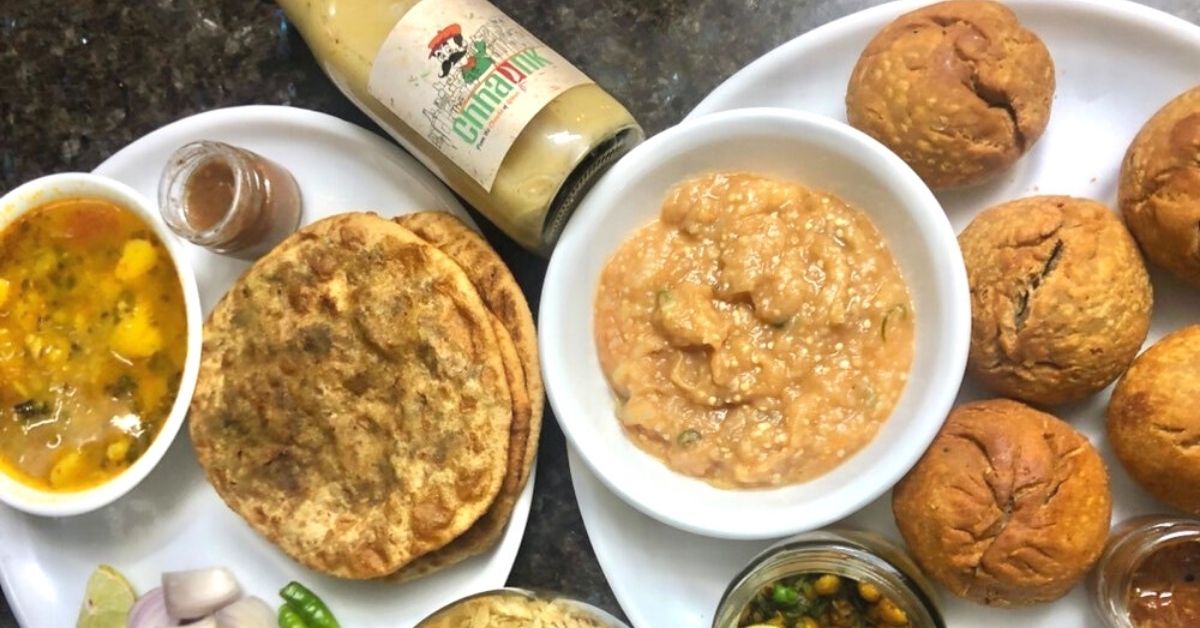Asif Naim, who works in Delhi, loves ordering the Bihari delicacy champaran mutton, and makes sure he does it at least twice a month. But it’s not just from any restaurant. He orders it from The Chhaunk, a cloud kitchen based in the city.
“I have ordered it at least 10 times since August,” says Asif, adding, “I come from Uttar Pradesh and the quality and authenticity of Chhaunk’s food are brilliant. The food tastes like home-cooked meals and it takes me down the memory lane of my hometown and the traditional food I used to eat daily.”
This is precisely what the women behind The Chhaunk wanted to achieve when they launched their startup.
Hiranyamayi Shivani belongs to Patna, Bihar and so does her daughter-in-law, Manjari Singh. Living in Delhi since 2011, the duo often bond over their common love for Bihari cuisine.
During the second wave of the pandemic, Hiranyamayi missed her annual trip home to visit her relatives and friends.

“I was stuck as it became difficult to travel. However, a few days later, I realised that there could be many in the same situation as me who were unable to go home,” Hiranyamayi tells The Better India.
The lockdown restrictions also meant the natives could not visit home and enjoy the authentic Bihari cuisine, which is not easily available in Delhi. “I love cooking and so I decided to offer traditional Bihari cuisine through a homemade business model, hoping that customers will feel closer to home. I shared the concept with Manjari, and she was instantly on-board,” the 58-year-old says.
Hiranyamayi believes that Bihari cuisine is one of the most diverse cuisines in the world, which is exclusive to India. “The business would serve as a platform to showcase the food items and make it popular among the Bihari community living in Delhi as well as others,” she says.
So in July 2021, Hiranyamayi started offering street food through her home-based cloud kitchen under the name ‘The Chhaunk’, which means ‘tadka’ or ‘tempering’.
With a Pinch of Sustainability
“I use food recipes that have been inherited from my mother and use authentic spices and methods that have been passed down over generations,” she explains.
The duo offer a variety of food items, including staples such as dal, bhat, tarkari, roti and achar. “The community also consumes the traditional khichdi, which is made from rice broth and lentils seasoned in spices. The food is served with side dishes and is often a part of a mid-day meal during the weekend. We included all such items with traditional twists in the menu,” says Manjari.
The 35-year-old adds that they also offer all-time favourites like Litti Chokha. “Litti is made from sattu (roasted gram flour), and the latter is a mix of mashed potato, brinjal and tomatoes cooked together in traditional spices,” she adds.
They also serve snack items like Jhalmuri, Chura Matar, Bajka, Chura Badam, Dal Puri with Kheer, Sattu ki Kachori and Pulav.
“We also offer beverages like Sattu Sharbat, which is known to improve one’s appetite,” she says, adding that all the food items range between Rs 110 and Rs 445.
Manjari says that initially, they received 40 orders a day, which has now scaled up to 450. The startup earns Rs 4 lakh per month.
“Litti Chokha is the most popular food item and sells like hotcakes. But the increase in demand for the food is because of its simplistic nature,” Manjari claims.

“There is no decoration or over garnishing of the food. Our food is served with the same simplicity as one would find in a traditional Bihari home. The food is made-to-order to ensure its freshness,” she says.
Manjari says that another unique aspect of their business is that they do not use any plastic containers for packaging. “We are committed to being an environmentally-friendly company. So we deliver food in airtight glass containers. Our customers keep the container for reuse,” she says.
Putting Bihari Food on a Global Map
Speaking of their deliveries, Manjari says, “We have registered on Zomato, Swiggy and other food delivery platforms.”
But neither one of the duo had experience in the food industry, so navigating the new terrain was hard at first. She adds, “We struggled to get the registrations and logistics in place. Bihari food is not served widely across restaurants, so we were sceptical about the acceptance of our food. However, we were confident about the authentic, homemade taste and of people liking our food. But procuring resources and the authentic ingredients amidst the pandemic was a struggle. We learned on the go by filling the gaps.”
Manjari says they are already working on opening outlets in Delhi-NCR, Mumbai, Pune, Bengaluru and Jaipur.
“Very often, the food and the experience takes you back to the memories associated with it,” says Hiranyamayi. Adding to this sentiment, Manjari says, “We aim to take Bihari cuisine to every food lover around the world.”
Edited by Yoshita Rao
No comments:
Post a Comment